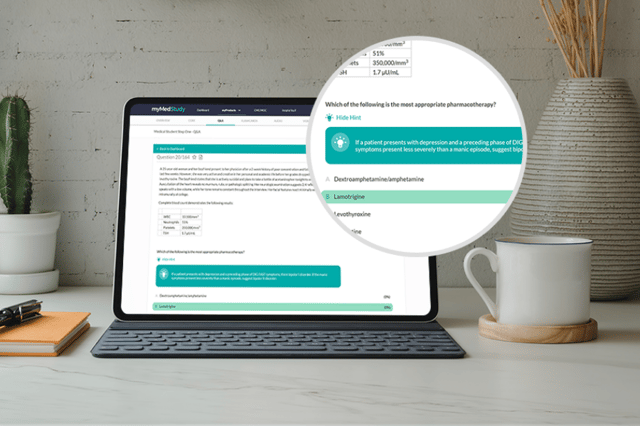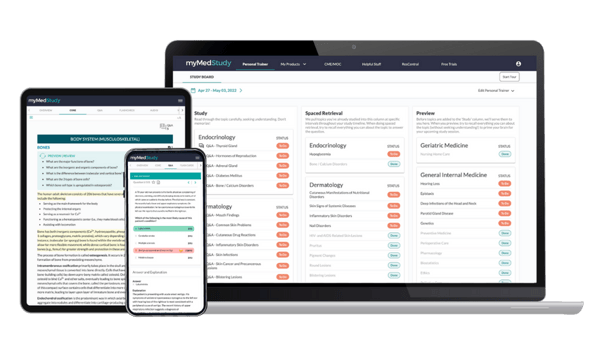
Ah, the age-old question: How do I excel in medical school?
Well, these tips might be a little different than you expected, so comb through them carefully. The answer may be more achievable than you first imagined.
How many hours a week does the average med student study?
Okay, listen. It doesn't matter how many hours you put into studying for med school if you're going about it in the wrong way. Studying an extra 10 or even 20 hours a week won't help you if you're using techniques that are counter-productive.
Learn to study efficiently while locking the must-know information into your long-term memory—that's where the power lies! For example, highlighting and re-highlighting doesn't help you remember the information. Studying in the same boring spot every day can actually be detrimental to encoding. Focusing on one topic at a time won't help you recall pertinent facts on a test or when you're with patients.
Want to figure out how to study efficiently? Dive into the StudyWISE guide—you'll discover brain-hacking techniques that just might cut back on the average hours you study in a week.
Plus, the StudyWISE guide explains the MedStudy Method which is built into every learning tool and makes truly learning medicine easier.
How do you get A's in med school?
How do you get A's? The same way we tell residents to ace the boards and impress program directors: Practice recall! The best way to practice recall? Self testing.
Practicing recall/self-testing is one of the very best ways to lock must-know information into your long-term memory (along with spaced retrieval!). So don't just read. Also make time to answer questions in your Qbank+ daily. Med school Q&As are:
- A good means of self-assessment of your current knowledge
- The ideal presentation of facts, concepts, and processes
- A means of processing the material into long-term memory
Qbank+ with both Step 1 and Step 2 questions is one of the best ways to practice recall of must-know med school information.
So basically, to get A's in med school, you need to do the opposite of cramming! Cramming before an exam might feel like a necessity when you’re in a crunch, but usually the information you just studied will leave your brain right after the exam. And in medical school, everything is compounding, so you’ll want to really learn the information for the long term.
How can I be successful in medical school?
Along with earning good grades, it's important to get involved to be successful in med school. After all, being successful in medical isn't solely based on academics. Make the effort to do things like volunteer so that you don't have terrible patient skills. Get to know your peers by joining a student organization so that you know how to be part of a team when you get to residency and beyond. These sorts of things will also help you differentiate yourself for residency applications.
Plus, don't forget about making time for your hobbies and self-care. We know it's hard! But guess what? Studying the right stuff, in the right way allows you to learn more and cram less. (👈This is what it means to #StudySTRONG.) In short: You just might have more time to actually enjoy life while in med school! And that's part of being successful, too.
Do I need a mentor in med school?
Excelling in medical school—and in the rest of your medical career—is made easier with the guidance of a mentor. Do you absolutely need a mentor in med school? Not necessarily, but med school mentors are helpful for lots of reasons. Here are three ways a mentor helps med students:
- Aid in identifying research opportunities
- Provide career advice
- Guide through the residency application process
Need some tips on how to find a mentor? We got you.
What is the fastest way to memorize for medical school?
The fastest way to memorize for medical school is to use the Medical Student Study Strong System! Why? Because of the MedStudy Method. It combines the best evidence-based learning techniques into a system that makes learning medicine easier.
And, we make it easy to use the MedStudy Method by giving you Personal Trainer—which creates a personalized study plan, adapts to any changes in your schedule, and keeps track of what you accomplish. This interactive learning guide takes you through the three stages of the learning process using all the material in Core and Qbank+. It helps you plan and then organizes and tracks all you do. Forget about creating study calendars or timelines; Personal Trainer does it all for you.
Ready to #StudySTRONG? Try the med student system for free! You may just find the answer to how to excel in medical school.





